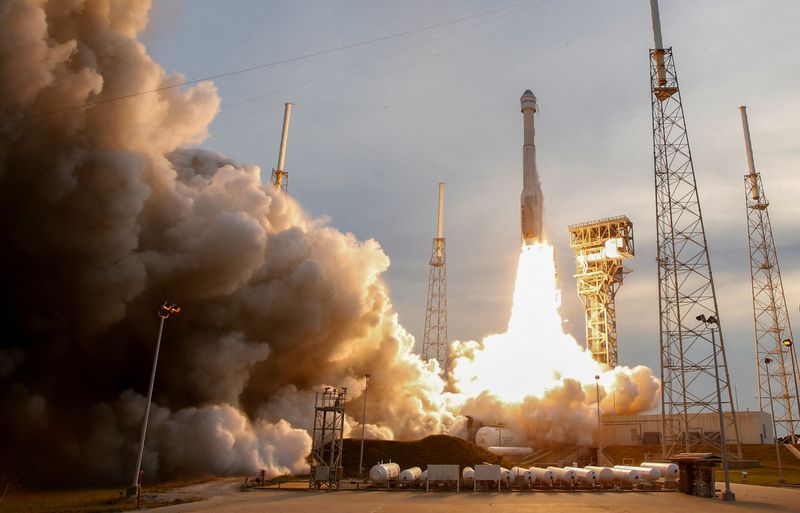By Steve Gorman and Joey Roulette
(Reuters) -Boeing Co's (N:BA) Starliner astronaut capsule returned from the International Space Station and landed in New Mexico on Wednesday, capping a high-stakes test flight as NASA's next vehicle for carrying humans to orbit.
Less than a week after its launch from the Cape Canaveral U.S. Space Force Base in Florida, the CST-100 Starliner capsule plunged through Earth's atmosphere Wednesday evening ahead of a parachute-assisted descent over the desert of White Sands Space Harbor, New Mexico. It touched down on time at 6:49 p.m. EDT (2249 GMT).
The roughly five-hour return trip from the space station, an orbital outpost some 250 miles above Earth, checks off the last leg of a repeat test flight that Boeing had first attempted in 2019, but failed to complete after running into software failures.
The latest test mission moves Starliner, beset by repeated delays and costly engineering setbacks, a major step closer to providing NASA with a second reliable avenue for ferrying astronauts to and from the space station.
Starliner was lofted to orbit last Thursday atop an Atlas (NYSE:ATCO) V rocket furnished by the Boeing-Lockheed Martin joint venture United Launch Alliance and achieved its main objective - a rendezvous with the ISS, even though four of its multiple onboard thrusters malfunctioned along the way.
Boeing engineers also had to improvise a workaround for a thermal control defect during the final approach of the capsule to the space station.
Since resuming crewed flights to orbit from American soil in 2020, nine years after the space shuttle program ended, the U.S. space agency has had to rely solely on Falcon 9 rockets and Crew Dragon capsules from billionaire Elon Musk's private company SpaceX.
Previously, the only other option for reaching the orbiting laboratory was by hitching rides aboard Russia's Soyuz spacecraft, an alternative currently less attractive in light of heightened U.S.-Russian tensions over the war in Ukraine.
Much is on the line for Boeing, as the Chicago-based company scrambles to climb out of successive crises in its jetliner business and space-defense unit. The Starliner program alone has cost the company nearly $600 million over the past 2-1/2 years.
An ill-fated first orbital test flight of Starliner in late 2019 nearly ended with the vehicle's loss following a software glitch that effectively foiled the spacecraft's ability to reach the space station.
Subsequent problems with Starliner's propulsion system, supplied by Aerojet Rocketdyne, led Boeing to scrub a second attempt to launch the capsule last summer.
Starliner remained grounded for nine more months while the two companies sparred over what caused fuel valves to stick shut and which firm was responsible for fixing them.

The do-over test mission that wrapped up on Wednesday could pave the way for Starliner to fly its first astronaut crew to the space station sometime next year, pending a redesign of Starliner's propulsion system valves and a resolution of the thruster issues that popped up mid-mission.
The orbiting outpost is currently home to a crew of three U.S. NASA astronauts, an Italian astronaut from the European Space Agency, and three Russian cosmonauts. While Starliner was parked to the station, some of those astronauts boarded the capsule to analyze its cabin conditions.
(